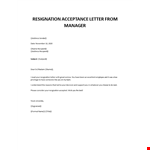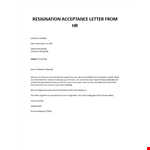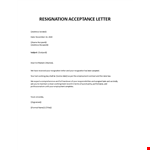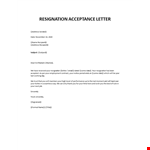When an employee submits their resignation and you, as an employer, decide not to accept it, it is important to communicate your decision effectively and professionally. A resignation not accepted letter to the employee serves as a formal response to their resignation, outlining the reasons for not accepting it and providing guidance on how to move forward.
Resignation acceptance letters are commonly used to acknowledge an employee's decision to resign and to facilitate a smooth transition process. However, in some situations, employers may choose to reject an employee's resignation for various reasons.
In such cases, a well-crafted resignation not accepted letter becomes crucial. It is essential to clearly explain the reasons behind the decision while maintaining a respectful tone. This letter serves as an opportunity to address any concerns or discuss alternatives that may have led to the rejection of the resignation.
Additionally, it is important to express gratitude and appreciation towards the employee for their contributions and to offer support during this period. A well-written thank you letter for accepting the resignation can help maintain a positive relationship and ensure that the employee feels valued despite the rejection.
Furthermore, a relieving letter can be provided to the employee, detailing their employment tenure and other relevant information. This letter serves as proof of employment and can be useful for future job prospects.
Follow-up emails for resignation acceptance can also be sent to reiterate the decision and provide any additional information or instructions necessary for the employee to proceed.
Knowing what to say when an employee resigns can be challenging, especially when their resignation is not accepted. However, by following these guidelines and utilizing appropriate templates and samples, employers can effectively communicate their decision while maintaining professionalism and honoring the employee's contributions.





